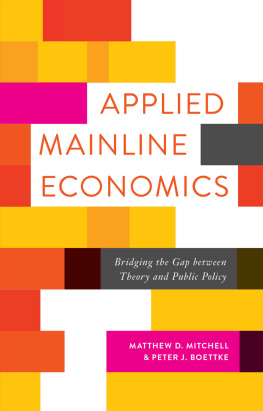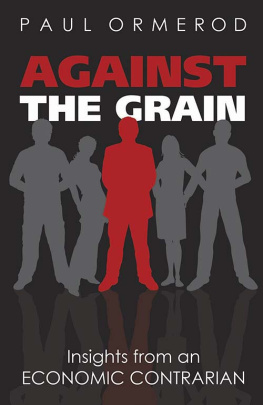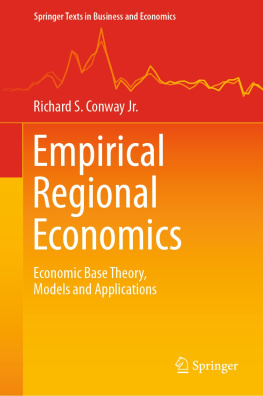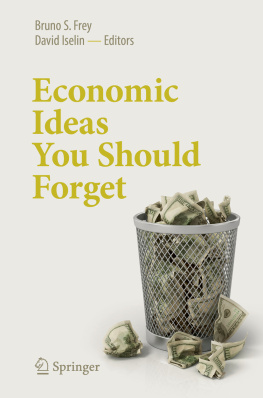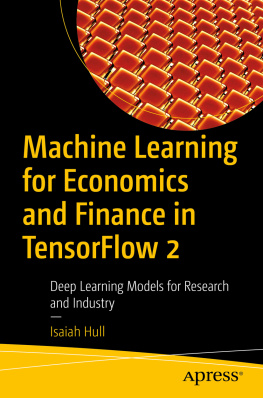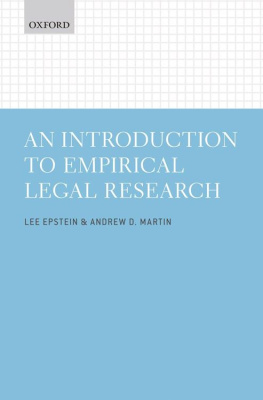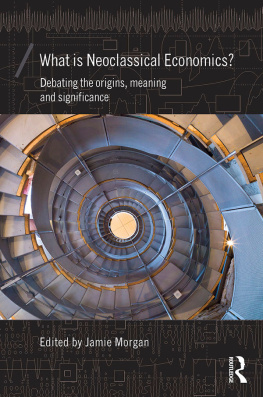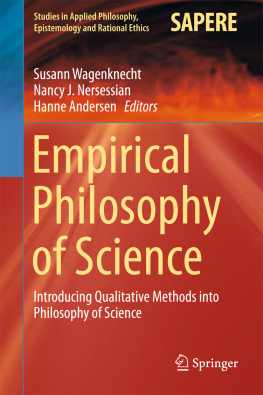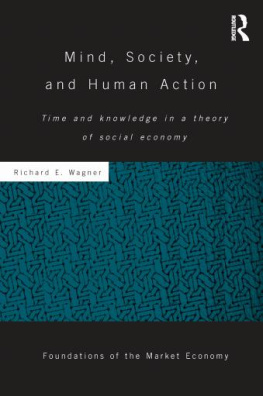ADVANCED STUDIES IN POLITICAL ECONOMY
Series Editors: Virgil Henry Storr and Stefanie Haeffele-Balch
The Advanced Studies in Political Economy series consists of republished as well as newly commissioned work that seeks to understand the underpinnings of a free society through the foundations of the Austrian, Virginia, and Bloomington schools of political economy. Through this series, the Mercatus Center at George Mason University aims to further the exploration and discussion of the dynamics of social change by making this research available to students and scholars.
Nona Martin Storr, Emily Chamlee-Wright, and Virgil Henry Storr, How We Came Back: Voices from Post-Katrina New Orleans
Don Lavoie, Rivalry and Central Planning: The Socialist Calculation Debate Reconsidered
Don Lavoie, National Economic Planning: What Is Left?
Peter J. Boettke, Stefanie Haeffele-Balch, and Virgil Henry Storr, eds., Mainline Economics: Six Nobel Lectures in the Tradition of Adam Smith
Matthew D. Mitchell and Peter J. Boettke, Applied Mainline Economics: Bridging the Gap between Theory and Public Policy

Mercatus Center at George Mason University
3434 Washington Blvd., 4th Floor
Arlington, VA 22201
703-993-4930
mercatus.org
Copyright 2017 by Matthew D. Mitchell, Peter J. Boettke, and the Mercatus Center at George Mason University. All rights reserved.
Printed in the United States of America
Cover and interior design by Joanna Andreasson, Brooklyn, NY
Typesetting and composition by Westchester Publishing Services, Danbury, CT
Index by Connie Binder, Laurel, MD
Library of Congress Cataloging-in-Publication Data
Names: Mitchell, Matthew D., author. | Boettke, Peter J., author.
Title: Applied mainline economics : bridging the gap between theory and public policy / Matthew D. Mitchell and Peter J. Boettke.
Description: Arlington, Va. : Mercatus Center at George Mason University, [2017]
Identifiers: LCCN 2016049099 (print) | LCCN 2016058187 (ebook) | ISBN 9781942951285 (pbk.) | ISBN 9781942951292 (Kindle ebook)
Subjects: LCSH: Economics. | Economic policy.
Classification: LCC HB171 .M549 2017 (print) | LCC HB171 (ebook) | DDC 330dc23
LC record available at https://lccn.loc.gov/2016049099
MM
For Megan, Margaret, Elizabeth, and Stephen. You are the lights of my life.
PB
To Brian Hooks, whose tireless efforts made our research at the Mercatus Center with the Global Prosperity Initiative, Enterprise Africa, and the Gulf Coast Recovery Project possible. If I was trying to bridge a gap between theory and praxis, it was Brians work throughout the decade that actually built the bridge.
CONTENTS
In the study of society exclusive concentration on a speciality has a peculiarly baneful effect: it will not merely prevent us from being attractive company or good citizens but may impair our competence in our proper field. The physicist who is only a physicist can still be a first-class physicist and a most valuable member of society. But nobody can be a great economist who is only an economistand I am even tempted to add that the economist who is only an economist is likely to become a nuisance if not a positive danger.
Friedrich A. Hayek, The Dilemma of Specialization
No society can surely be flourishing and happy, of which the far greater part of the members are poor and miserable.
Adam Smith
HOW DO HUMAN societies work, and how can we make them work better? What methods, ideas, and strategies should we use to help us answer these questions? Economists have more empirical toolsmore data and more sophisticated ways of testing those datathan ever before. We have randomized controlled trials and quasi-natural experiments; we have panel data methods and instrumental variables techniques. Adopted or adapted from the hard sciences, these tools are designed to disentangle causation from correlation, and they promise to offer us a better understanding of human relationships. They are also popular with researchers and have become standard tools in the toolkit of the mainstream economist.
But unless those who employ these techniques also practice what we at the Mercatus Center at George Mason University call mainline economic thinking, these new empirical methods are liable to generate more heat than light. As the name implies, mainline economic thinking comprises the core tenets of economic knowledge. And though mainline concepts are constantly evolving, they draw their inspiration from, and are intimately connected with, the enduring lessons of early economic thinkers. A line connects the contemporary variants of these ideas to insights of Thomas Aquinas of the 13th century; the Scottish Enlightenment thinkers, such as Adam Smith, of the 18th century; and the Neoclassical School of the early 20th century. Thinkers in the last few decades have extended this line of inquiry, including Nobel laureates F. A. Hayek, James Buchanan, Ronald Coase, Douglass North, Vernon Smith, and Elinor Ostrom.
Mainline economics emphasizes that the market is a dynamic process, that institutional and cultural context shapes that process, and that political institutions are themselves the product of exchange. The mainline thinkers teach us that certain complex social orders compel self-interested men and womenas if by an invisible handto serve the interests of their fellows. We use the term mainline in contrast with mainstream techniques that come and go, and it is our contention that these ideas ought to always be at the heart of economic analysis, irrespective of the latest trends.
In this book we summarize the ideas of mainline economics. Our goal is to introduce those working at the cutting edge of economic research and policy making to too-often-neglected concepts that offer a deeper understanding of the process of human interaction.
We begin with a puzzle that has vexed economists for more than 200 years, and we briefly survey the empirical tools that might answer this question. We show that this puzzle cannot be understood without grounding the analysis in theory, suggesting that the first place to start is with mainline economic theory.
We then discuss the core tenets of this theory. Throughout the discussion, we offer the reader examples of how these tools have helped researchers and policy analysts bridge the gap between ideas and real-world problems. Because these tools were synthesized and honed by researchers associated with George Mason University (Mason), we conclude with a brief history of that synthesis.
One question is perhaps the most importantand elusivemystery in social science. It is the Big Question that Adam Smith set out to investigate more than 200 years ago: why are some societies fabulously wealthy while others are miserably poor?
The question calls out to us from the spreadsheets of international statistics that show that in 2015, the average Canadian produced 79 times as much (and therefore was able to consume roughly 79 times as much) as the average Burkinabe.
Prosperity matters. Greater wealth, of course, buys us nicer vacations and fancier gadgets. But it also buys us longer life spans. As Harvard economist Benjamin Friedman has argued, wealth even seems to make us better people:
Economic growthmeaning a rising standard of living for the clear majority of citizensmore often than not fosters greater opportunity, tolerance of diversity, social mobility, commitment to fairness, and dedication to democracy.
Happily, greater income need not come at the expense of the least well off. World Bank economist Branko Milanovic calculates that the median earner in the United States earns more than 90 percent of the earths inhabitants, and even the bottom 2 percent of US earners still earn more than 62 percent of the global population. High and rising incomes do not solve all human problems. High-income societies have their share of maladies, including homelessness, obesity, and violence. But the overwhelming weight of evidence suggests that more economically prosperous societies have fewer and less severe problems.
Next page
